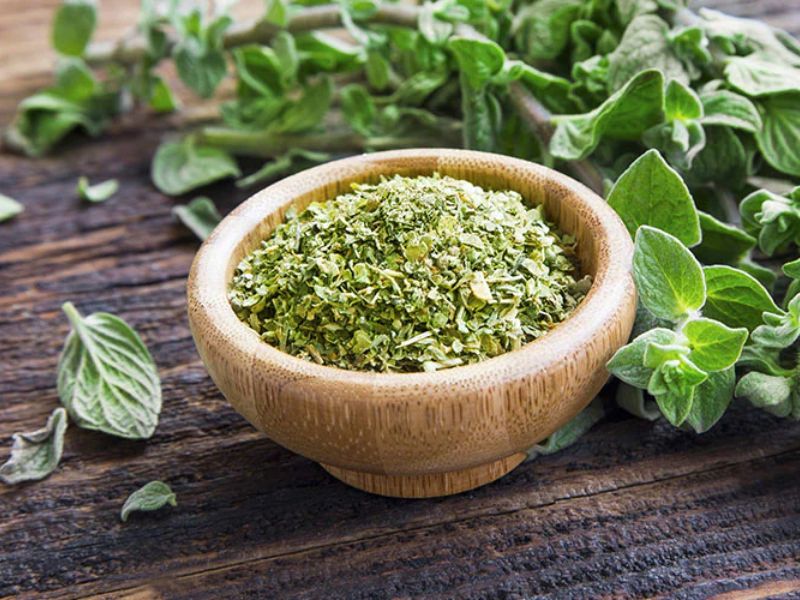When you’re trying to cook up something delicious, you don’t want to be limited by what you can access.
Oregano is one of those things that can be hard to come by—especially if you’re in a part of the world where it’s not grown locally or there’s no such thing as an herb shop.
You might think that you’ll never be able to make your favorite Italian dishes without oregano again, but there are definitely some substitutes for oregano out there!
The 7 Best Substitutes For Oregano
#1 Marjoram
Marjoram is a relative of oregano, but it has a different flavor that you may find more appealing. It has a milder taste than oregano and is often used in meat dishes, because it pairs well with the flavor of meat.
Marjoram can also be used to add flavor to soups and stews, but it’s best to use it sparingly, as its flavor can be overpowering if used too much. The leaves are most often used in cooking—they can be dried out and ground into powder or used fresh as part of a recipe.
#2 Thyme
Thyme is a perennial herb that has been used as a spice and medicinal plant since ancient times. It’s native to the Mediterranean region and Asia, but it’s grown elsewhere in the world as well.
Its leaves are dark green on top and silver underneath, with a strong scent and taste that’s similar to oregano—but not quite as pungent or potent.
Thyme can be used as a substitute for oregano in most recipes, especially those that aren’t super-spicy or heavily seasoned with other spices such as cumin or garlic. It’s also great for marinades and dressings because it adds a subtle kick of flavor without overpowering anything else you might add to them (like vinegar).
#3 Basil
Basil is a great herb to have on hand, but it’s not an exact match for oregano. It has a sweeter flavor, which can work well in dishes like tomato sauces and sweet-and-sour chicken.
You can also use basil as a seasoning for salads and sandwiches. If you don’t have oregano, try substituting basil in any recipe that calls for the Italian herb.
Basil has a more delicate flavor than oregano, so it won’t stand up well in spice blends or dishes with strong flavors like soups or stews.
While both herbs are great for adding a pop of color to your food (just look at how much green there is in the picture above!), basil isn’t as versatile as oregano—it’s best used in recipes where the main ingredient isn’t strongly flavored itself (such as tomatoes).
#4 Savory
Savory is a perennial herb that has a similar flavor to oregano and is often used as a substitute for it. It comes in two varieties, summer savory and winter savory. Both varieties have an aromatic scent and taste, but winter savory has more of a spicy kick, while summer savory tastes more like thyme.
Savory is often used as an alternative to oregano in dishes like soups and stews because it has many of the same properties as oregano and can be used interchangeably in most recipes that call for it.
#5 Rosemary
Similar to oregano in flavor, rosemary is a great substitute for oregano in recipes. Rosemary is native to the Mediterranean, but it can flourish in other regions as well. It has a piney scent that provides a fresh taste to recipes. The flavor of rosemary is more subtle than oregano’s, so it works best in dishes that are already bold in flavor and need an additional boost.
Rosemary can be used interchangeably with oregano in recipes. However, it has a sweeter taste than oregano and will add an herbal note to any dish it is added to—so if you’re looking for something spicy or savory, you might want to stick with oregano.
#6 Sage
Sage is a very popular herb that has been used for centuries in cooking and medicine. It’s commonly used in Italian dishes, but it can also be combined with other herbs to create new flavors and aromas.
Both herbs have similar aromatic qualities—they both have earthy and peppery notes, but sage is also very bitter, so it should be used sparingly. It’s often used as an alternative to oregano when you want something milder, or if you don’t want the sharpness of oregano’s citrus notes.
#7 Parsley
Parsley is a great substitute for oregano, especially when you’re cooking with fresh herbs.
Parsley has a mild flavor that makes it easy to work with in recipes. It’s also easy to grow, so you can have fresh parsley on hand whenever you need it.
The taste of parsley can be described as “herbaceous” or “green,” which means it has a hint of freshness and earthiness but not much else—that’s why it’s such a good addition to your dishes.
If you’re looking for something with more flavor, try using cilantro instead!
Conclusion
As you can see, there are a lot of substitutes for oregano. Some of them are more versatile than others, so make sure you’re careful about which ones you use in which recipes.
If you’re looking for something that’s going to give you a more intense flavor than the other options, then cumin and basil, savory are definitely your best bet.
However, if you’re looking for something with a bit more complexity and depth, then try substituting thyme or marjoram for oregano in your favorite recipes.




